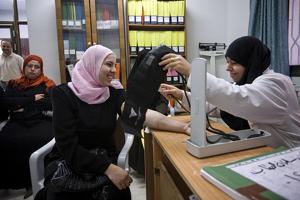
Caritas is committed to high quality and transparency in its programmes as in this health clinic in Gaza City. Credits: Katie Orlinsky/Caritas 2010
Interview with Naguib Khouzam, General Supervisor of Caritas Egypt’s SETI Centre and Professor of Educational Psychology at Ain Shams University.
Mr. Khouzam, you are the General Supervisor of the Caritas Egypt’s SETI Center for disabled people. This centre trains special needs teachers, supports disabled people and their families and runs research in this field. What insight from your experience did you want to share at the Synod?
Mr. Khouzam: The topic of this Synod is “Communion and Witness”. In my speech, I decided to focus on one point, witnessing through social work in Catholic schools and organisations like Caritas. In my opinion, there are four essential factors to make this work effective.
The first one is a certain spirit of work, based on love of others and Caritas’s vision to help the poorest.
The second factor is quality. In order to ensure quality services, indicators should be set up and checked through rigorous monitoring and regular feedback from participants and external people.
Empowerment is another important issue. There necessarily comes a time in our work where we have to step back, so in order to be effective, we need to get people to help themselves and transmit their newly learnt knowledge and skills to others.
Take our training programmes for mothers . These are often attended by very young, illiterate or underprivileged mothers. Eight women are trained together in a group through discussions, practical exercises and learning materials adapted to their circumstances. Through this training, these women gain new confidence in themselves. This is essential. An illiterate mother for example won’t be able to help her son on school work, but through her moral support and her attitude towards school, she plays a very important role in his success. We have even seen illiterate mothers learning how to read and write once they became more self-confident. At the end of the programme, many mothers form groups to transmit their new skills, always with our continuous support.
The last factor is accountability. Several thousand disabled people and their families benefit from our programmes every year and we train around 500 teachers and psychologists. Evaluating our work in a clear and transparent way helps us improve our programmes and allocate funds more efficiently.
How do you empower disabled people at the SETI center?
Mr. Khouzam : I prefer ‘diffabilities’ rather than disabilities. It is a radically different way of viewing things. The people we call disabled are just as capable as us, but in a different way.
Every person has a gift. Our task is to help people discover and express their talent. I am short-sighted for example. If glasses didn’t exist, I would be considered disabled. As for blind people, recent progress in information technology has changed their life. They can now write and receive emails and text messages thanks to special technologies, so their difference doesn’t keep them from fully participating in that field anymore.
We need to find ways for people to participate. The person is never the problem, it is its environment, the system we live in.
Diversity and its richness is something we should appreciate more. Sure, the disabilities of some of the autistic or special needs child in our centres will keep them from learning how to read and write. But you should see the pictures and sculptures these children can make. For several years now, we have organised successful art expositions at the centre.
How could your ideas be included in the Church’s social work?
Mr. Khouzam: The entire work of the Church could benefit from these four factors. They could be included in the training of priests and non-religious people working for the Church and organisations like Caritas.
Take the Synod as an example. At the end of numerous debates opposing different ideas, a list of recommendations will be written. I think every person who followed this Synod should ask himself how he can apply these results in his local setting back home. What counts in the end, is what we accomplish, how we manage to help people in need.
